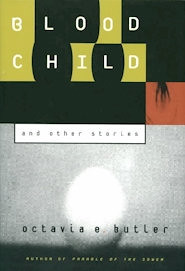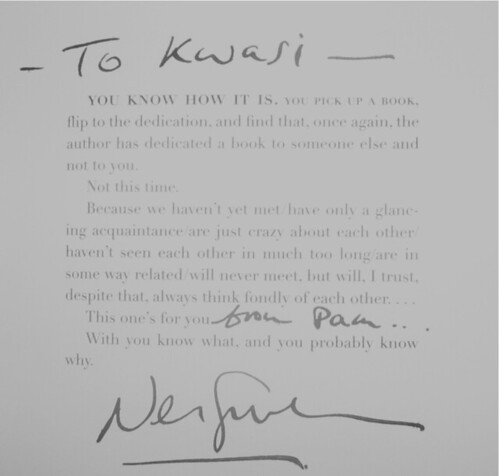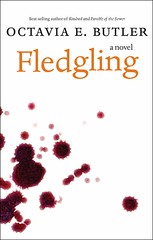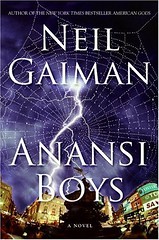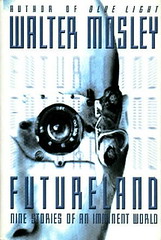
"Futureland: Nine Stories of an Imminent World" is Walter Mosley's second science fiction book. Unike the title suggests, it is not a series of unrelated short stories. Instead, all the stories share the same world and have common characters and locations. This makes the book more like a novel which looks at the lives of several different people in order to fully examine the world in which they live, a generation after this one. In doing so, Mosley covers a very wide range of issues and makes some scarily plausible predictions about the direction in which we are headed. In a little over three hundred and fifty pages, he looks at the future of race, gender, global capitalism, the media, civil liberties, the American obsession with beauty and a host of other topics. What really makes it disturbing to read is the fact that, especially after the September eleventh attacks, it is already possible to see some of his predictions beginning to happen.
Mosley's characters are also an incredibly diverse and unusual cast, especially for a science fiction novel. They include factory workers, criminals, the smartest person on the planet, the first female heavyweight boxing champion and a futuristic replacement for Easy Rawlins. Also, they are are representative of the underclass in the society. They usually represent the common, even more repressed, people who live in that world and it is through them that he makes us aware of the injustices of his brave new world.
The nine stories that make up "Futureland" are entitled "Whispers in the Dark", "The Greatest", "Doctor Kismet", "Angel's Island", "The Electric Eye", "Voices", "Little Brother", "En Masse" and "The Nig in Me". I am not going to deal with each story separately because they share similar themes, the same environment and sometimes the same characters. Because of this, it makes more sense to consider all of the stories as one large novel and deal with it in terms of characters and themes rather than revisit the same themes over and over again in a variety of different scenarios. Obviously, I cannot cover all the themes that show up in this book since it is incredibly dense in the issues it covers. However, some of these themes receive far more attention than others so the focus of this paper shall be narrowed somewhat to look mainly at what I consider to be the most important themes in the book. These will be race, global capitalism and civil liberties. All of these themes show up in almost every story and so it makes sense to spend the most amount of time dealing with them.
Obviously, I am going to start off taking a look at the way race is presented in "Futureland". The very first story in the book, "Whispers in the Dark", gives us a very apt idea of what Mosley considers the fate of black people to be a generation from now. Namely, still an underclass. In the story, the smartest human being alive, Ptolemy Bent is born to a family too poor to afford the kind of education required by the state for someone of his intelligence. In order to keep him from being taken away, his uncle,Chill, a convict with no job prospects, is forced to sell several of his body parts ,including his eyes, spine, and penis, in order to keep the family together. According to Mosley, in their community this has become the norm for people desperate for money. In "Angel's Island", we see the inside of private-owned maximum security prison where, as usual, a majority of the inmates are people of color. In "The Electric Eye", we are introducet to Folio Johnson, the futuristic replacement for Easy Rawlins. We are also introduced to the International Socialists, a modern day version of the Nazi party who do not allow Jews in their party because "Zionism is incompatible with social evolution" . Later on in that story and in "En Masse" and "The Nig in Me", we are made aware of their plot to crate a race specific virus targetting black people. However, the virus mutates and instead kills everyone who is not at least 12.5 precent black. This solves nothing, however, as groups of 'white' looking survivors, hispanics and black survivors begin to fight each other showing that there is no easy answer to the question of race. As you can see from the title of his last story, the word 'nigger' has been shortened to 'nig' but still maintains all of the controversy about its use that it has now.
Capitalism and Globalization are two other concepts that show up in virtually every story. Curiously, Mosley chooses to call his Nazis socialists which indicates to me that he is not advocating any kind of socialist revolution. Instead he is just pointing out issues with the current system of capitalism in use pretty much everywhere and the direction in which it is going. One of the new concepts he introduces is the concept of companies having achieved sovereign status. The company he uses to illustrate this concept is Macrocode International,the largest company on the planet, which turns up in almost every one if his stories. In "Doctor Kismet", we are shown the sovereign island state that doubles as Macrocode's headquarters and we are introduced to its leader, Dr. Kismet. We also learn that the fastest growing religion on the planet is actually a Macrocode company. In "The Electric Eye", we find out that a branch of Macrocode is helping develop a virus targeted at black people. We also find out that there are only five independent restaurants in the whole of New York. All the others are members of one franchise or the other. Therefore, corporations have virtually wiped out independent traders. In "Little Brother" a follower of Infochurch, the Macrocode religion, is unwittingly used as a guinea pig to to test a Macrocode designed automated justice system for poor people. In "En Masse", we are given a very grim view of the life of the future worker. People are treated like machines and their every action monitored. Any kind of individuality or human contact is punished. Even hugging your spouse could violate sexual harassment policies. A lack of a job means a person goes into government sponsored housing and becomes a 'backgrounder', eating and sleeping in shifts to conserve space while having almost no hope of getting a job and returning to a normal life. In his world, the corporations legally control the people who work for them. Considering what I know of modern corporate America, it is not hard to see where these predictions come from nor is it hard to believe in their plausibility.
The final theme I choose to examine is that of civil liberties. Already, since September, there have been several attempts by the government to gain more control of its citizens at the expense of their constitutional rights. In "Futureland", this has been taken several very frightening steps further. The convicts in "Angel's Island"have had their constitutional rights legally revoked for the period of time that they are prisoners meaning that the prisons are the final judges of their fate. In this case they are all used as slave labor on a plantation. All citizens are implanted with tracking chips to make it easier for the police to keep track of their activities and the cities are patrolled by little spy cameras called 'nosers' which, like the video cameras going up everywhere today, keep tabs on people. It is also required that newspapers publish the names of anyone with a criminal conviction so employers can be sure the people they are hiring are not criminals. Again, these scenarios are a little too frighteningly possible, especially seeing how everyone is trying to cash in on the increased sense of vulnerability in this country following 9-11.
What makes this book so unsettling is how immediately possible it is. Mosley proposes very little that is truly revolutionary. Most of what he does propose is easily a very short step away from the world we live in now, which is incredibly scary. With luck this book will never come any closer to reality than it is now but I'm generally cynical when it comes to human nature so I'm not holding my breath.
